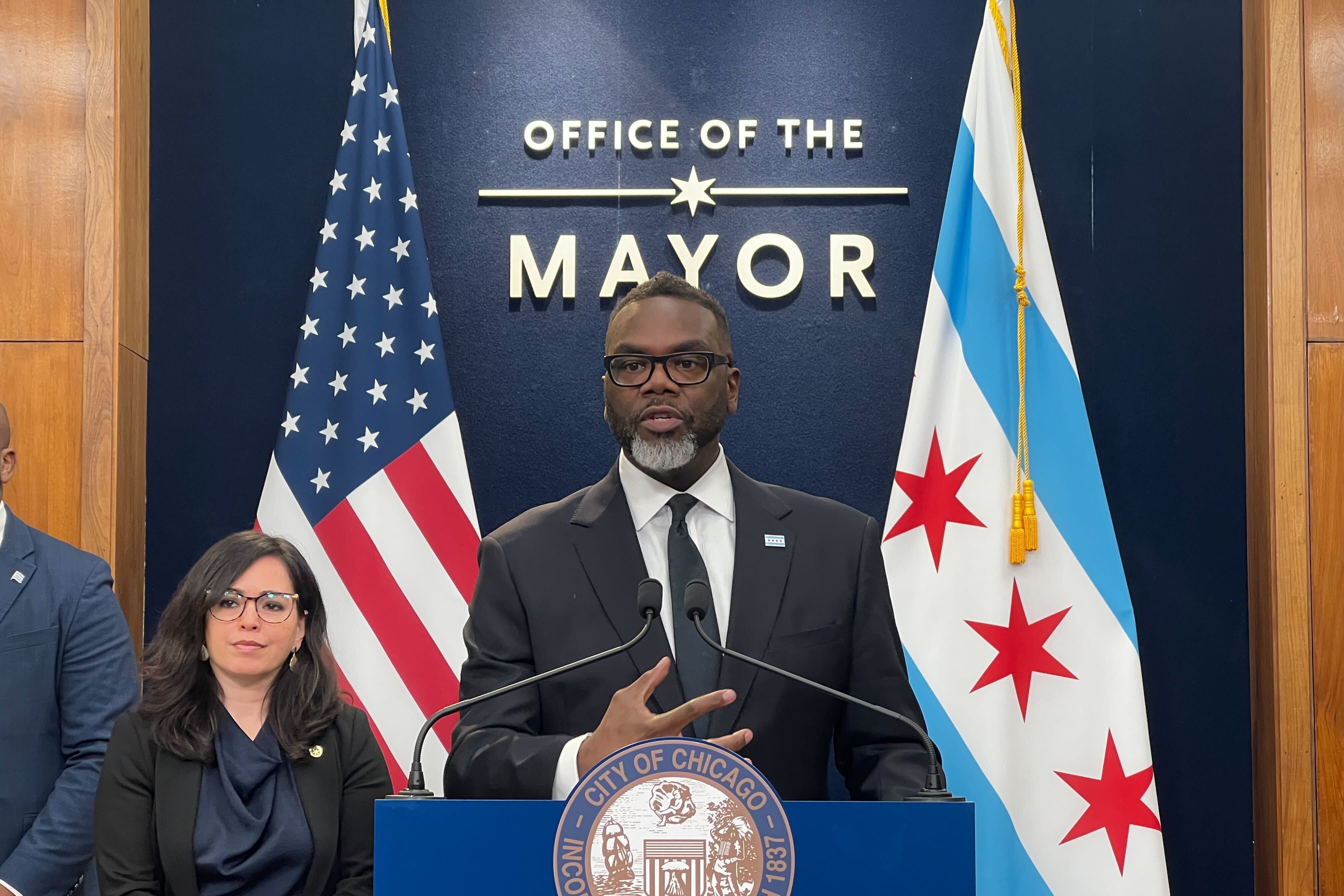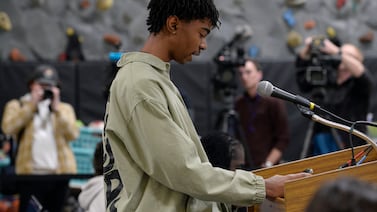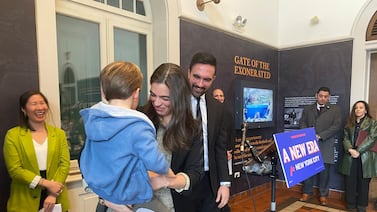Sign up for Chalkbeat Chicago’s free daily newsletter to keep up with the latest education news.
Mayor Brandon Johnson on Tuesday criticized Chicago Public Schools leadership in relation to a heated school closure proposal by the Acero charter school network and used the moment to call for greater accountability of charter schools.
Johnson, however, did not elaborate on what steps he would like to see the district take to prevent those closures. The Chicago Board of Education does not appear to have a legal path to stop the closures, according to its agreement with Acero.
While Johnson emphasized that he’s not saying CPS CEO Pedro Martinez did something wrong, he said the district needs to put together a “contingency plan” in response to the proposed Acero closures and that he and his team “haven’t seen that type of leadership” from the district.
The proposed Acero closures have added tension to the already tense relationship between Chicago Public Schools leadership and Johnson, who in September asked Martinez to resign. Martinez has refused to step down.
On Tuesday, Johnson also questioned how the Acero network — whose staff is unionized by the Chicago Teachers Union, a Johnson ally — reached its current financial situation just a year after CPS deemed it worthy of a three-year contract extension. The network has blamed the closures on a $40 million budget shortfall, Block Club Chicago reported.
“This is not about pointing the finger at someone doing something wrong — this is about how we course correct so families don’t lose out,” Johnson said.
Acero did not immediately responded to requests for comment.
In an email statement to Chalkbeat, a CPS spokesperson said the district is working with the charter network’s leadership to schedule a parent town hall, hold ongoing town hall meetings, and provide support for students.
According to the CPS spokesperson, when a charter decides to close, CPS implements internal procedures including contacting families to review options, such as neighborhood schools or schools with available seats, and providing financial support to district schools that could see an influx of students from the closed schools.
Last month, the Acero network announced that it was planning to close seven of its schools, or about half of those it operates, impacting about 2,000 students at those campuses. The network cited a $40 million budget shortfall. It’s unclear where students will enroll, but those students, like any Chicago resident, have the right to enroll in their neighborhood school.
As a charter school network, Acero is privately managed but publicly funded. It is allowed to operate 15 campuses, largely on the Southwest Side, based on conditions set out in a contract with Chicago Public Schools. Acero’s current contract was last renewed in July 2023 and runs through June 2026.
Acero’s contract allows the network to close schools but says the network must provide written notice to the district by Oct. 15, and that closures can’t happen before June 30 or the end of the school year — whichever happens last, “except in situations of an emergency where the health, safety or education of the Charter School’s students is at risk.”
CPS did not immediately say whether the network notified the district by Oct. 15. The news of the proposed closures became public Oct. 9 — which CPS CEO Martinez has said publicly is around the same time he found out.
Since the network’s announcement, Acero families and teachers have rallied against the closures and have aired their concerns with the Chicago Board of Education.
Union officials have asked the district to intervene or to absorb the campuses and keep them open for another school year. When the district declined to renew an agreement with Urban Prep charter schools in 2022, CPS officials promised to keep those schools open as district campuses. That ultimately did not happen and the two campuses remain open under an agreement with Urban Prep until June 2025.
CPS did not immediately respond to questions about the options it might be considering pursuing at this point.
The Chicago Board of Education plans to hold a special meeting Thursday during which it will vote on a resolution calling for Acero representatives to come before the board and discuss alternatives to the closures. The resolution also says that if Acero ultimately closes the seven campuses, it “shall return all unspent public funds and property,” and that the district should extend its deadline for GoCPS — the application Chicago families use to apply to various schools, including charters and selective enrollment campuses — until Dec. 15. That deadline has already been pushed back to Nov. 22.
Asked why the mayor is advocating so strongly for Acero given his past criticism of charter schools, Johnson said he doesn’t want “any family to endure that type of trauma” that comes along with school closings.
Still, Johnson invoked a long time position of his — that as privately-run entities, charter schools should get more accountability. CPS is already tasked with monitoring charter schools, setting out conditions in each operator’s contract, and deciding whether operators’ schools should be renewed.
“Part of what my task is to challenge CPS and its leadership to respond to charter operators who have these structural elements within their budgetary framework that are not sustainable long term, and that will require audits,” Johnson said. “It will require CPS digging in a little bit deeper to look at the trends that are happening.”
Tensions continue to build between Johnson, CPS
On Monday, mayor’s office staff, including Chief of Staff Cristina Pacione-Zayas, and two of the mayor’s closest allies — Alds. Carlos Ramirez Rosa and Byron Sigcho-Lopez — met with CPS staff, including Martinez, about the proposed Acero closures. Chicago Board of Education members Olga Bautista and Frank Niles Thomas were also present, according to a source with knowledge of the meeting, who was not authorized to speak to the press about private discussions.
It was a “contentious discussion,” in which mayoral staff questioned CPS leaders about when they discovered the proposed closures, whether it has combed through the charter network’s financial documents, and what CPS has been doing about the issue, the source said. Martinez said the district has engaged with Acero families and is thinking through best options, the source said.
“Pedro’s story stayed consistent with what he’s said privately and publicly: He found out when the district did around the same time they went public,” the source said.
In an interview with Chalkbeat, Sigcho-Lopez said the meeting left him “concerned with [Martinez’s] leadership style” and, like the mayor, wanting an audit of Acero’s finances.
“He had a lot of excuses, a lot of contradictions, but not a lot of answers in terms of actually what he is going to do to ensure that those 2,000 kids are not forced, you know, into a transition that is not in anyone’s interest,” Sigcho-Lopez said.
Pacione-Zayas told Chalkbeat that CPS officials were asked if the district had reached out to the Illinois State Board of Education for guidance and if the district had considered absorbing the campuses – including how it would affect their budget.
“None of that was prepared,” Pacione Zayas said. “All that was revealed to us was that they extended the GoCPS [application deadline] by seven days.”
Families use the district’s GoCPS application to apply to schools, including preschool programs, selective enrollment, and magnet schools.
CPS has reviewed the costs behind a number of scenarios, including absorbing the campuses, according to a CPS source who was not authorized to speak with the press. The source declined to elaborate whether it was a viable option and said they were unsure if City Hall was aware of the district’s analysis.
Reema Amin is a reporter covering Chicago Public Schools. Contact Reema at ramin@chalkbeat.org.





